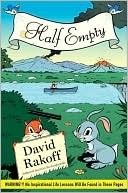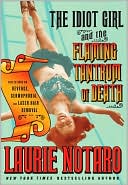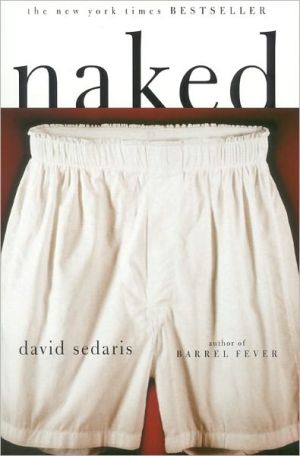Dress Your Family in Corduroy and Denim: Essays
Playwright and National Public Radio commentator David Sedaris lifts the corner of ordinary life, revealing the absurdity teeming below its surface. His world is alive with obscure desires and hidden motives - a world where forgiveness is automatic and an argument can be the highest form of love. Dress Your Family in Corduroy and Denim is another unforgettable collection from one of the wittiest and most original writers at work today.
Search in google:
David Sedaris plays in the snow with his sisters. He goes on vacation with his family. He gets a job selling drinks. He attends his brother's wedding. He mops his sister's floor. He gives directions to a lost traveler. He eats a hamburger. He has his blood sugar tested. It all sounds so normal, doesn't it? In his newest collection of essays, David Sedaris lifts the corner of ordinary life, revealing the absurdity teeming below its surface. His world is alive with obscure desires and hidden motives — a world where forgiveness is automatic and an argument can be the highest form of love. Dress Your Family in Corduroy and Denim is another unforgettable collection from one of the wittiest and most original writers at work today.USA TodaySedaris, humorist and author of the best-selling Me Talk Pretty One Day, once again exhibits his knack for spinning unsettling experiences into pure comic gold.—Allison Block
Dress Your Family in Corduroy and Denim\ \ By David Sedaris \ Little, Brown\ Copyright © 2004 David Sedaris\ All right reserved.\ ISBN: 0-316-14346-4 \ \ \ Chapter One\ Us and Them \ WHEN MY FAMILY FIRST MOVED to North Carolina, we lived in a rented house three blocks from the school where I would begin the third grade. My mother made friends with one of the neighbors, but one seemed enough for her. Within a year we would move again and, as she explained, there wasn't much point in getting too close to people we would have to say goodbye to. Our next house was less than a mile away, and the short journey would hardly merit tears or even good-byes, for that matter. It was more of a "see you later" situation, but still I adopted my mother's attitude, as it allowed me to pretend that not making friends was a conscious choice. I could if I wanted to. It just wasn't the right time.\ Back in New York State, we had lived in the country, with no sidewalks or streetlights; you could leave the house and still be alone. But here, when you looked out the window, you saw other houses, and people inside those houses. I hoped that in walking around after dark I might witness a murder, but for the most part our neighbors just sat in their living rooms, watching TV. The only place that seemed truly different was owned by a man named Mr. Tomkey, who did not believe in television. This was told to us by our mother's friend, who dropped by one afternoon with a basketful of okra. The woman did not editorialize-rather, she just presented her information, leaving her listener to make of it what she might. Had my mother said, "That's the craziest thing I've ever heard in my life," I assume that the friend would have agreed, and had she said, "Three cheers for Mr. Tomkey," the friend likely would have agreed as well. It was a kind of test, as was the okra.\ To say that you did not believe in television was different from saying that you did not care for it. Belief implied that television had a master plan and that you were against it. It also suggested that you thought too much. When my mother reported that Mr. Tomkey did not believe in television, my father said, "Well, good for him. I don't know that I believe in it, either."\ "That's exactly how I feel," my mother said, and then my parents watched the news, and whatever came on after the news.\ Word spread that Mr. Tomkey did not own a television, and you began hearing that while this was all very well and good, it was unfair of him to inflict his beliefs upon others, specifically his innocent wife and children. It was speculated that just as the blind man develops a keener sense of hearing, the family must somehow compensate for their loss. "Maybe they read," my mother's friend said. "Maybe they listen to the radio, but you can bet your boots they're doing something."\ I wanted to know what this something was, and so I began peering through the Tomkeys' windows. During the day I'd stand across the street from their house, acting as though I were waiting for someone, and at night, when the view was better and I had less chance of being discovered, I would creep into their yard and hide in the bushes beside their fence.\ Because they had no TV, the Tomkeys were forced to talk during dinner. They had no idea how puny their lives were, and so they were not ashamed that a camera would have found them uninteresting. They did not know what attractive was or what dinner was supposed to look like or even what time people were supposed to eat. Sometimes they wouldn't sit down until eight o'clock, long after everyone else had finished doing the dishes. During the meal, Mr. Tomkey would occasionally pound the table and point at his children with a fork, but the moment he finished, everyone would start laughing. I got the idea that he was imitating someone else, and wondered if he spied on us while we were eating.\ When fall arrived and school began, I saw the Tomkey children marching up the hill with paper sacks in their hands. The son was one grade lower than me, and the daughter was one grade higher. We never spoke, but I'd pass them in the halls from time to time and attempt to view the world through their eyes. What must it be like to be so ignorant and alone? Could a normal person even imagine it? Staring at an Elmer Fudd lunch box, I tried to divorce myself from everything I already knew: Elmer's inability to pronounce the letter r, his constant pursuit of an intelligent and considerably more famous rabbit. I tried to think of him as just a drawing, but it was impossible to separate him from his celebrity.\ One day in class a boy named William began to write the wrong answer on the blackboard, and our teacher flailed her arms, saying, "Warning, Will. Danger, danger." Her voice was synthetic and void of emotion, and we laughed, knowing that she was imitating the robot in a weekly show about a family who lived in outer space. The Tomkeys, though, would have thought she was having a heart attack. It occurred to me that they needed a guide, someone who could accompany them through the course of an average day and point out all the things they were unable to understand. I could have done it on weekends, but friendship would have taken away their mystery and interfered with the good feeling I got from pitying them. So I kept my distance.\ In early October the Tomkeys bought a boat, and everyone seemed greatly relieved, especially my mother's friend, who noted that the motor was definitely secondhand. It was reported that Mr. Tomkey's father-in-law owned a house on the lake and had invited the family to use it whenever they liked. This explained why they were gone all weekend, but it did not make their absences any easier to bear. I felt as if my favorite show had been canceled.\ Halloween fell on a Saturday that year, and by the time my mother took us to the store, all the good costumes were gone. My sisters dressed as witches and I went as a hobo. I'd looked forward to going in disguise to the Tomkeys' door, but they were off at the lake, and their house was dark. Before leaving, they had left a coffee can full of gumdrops on the front porch, alongside a sign reading DON'T BE GREEDY. In terms of Halloween candy, individual gumdrops were just about as low as you could get. This was evidenced by the large number of them floating in an adjacent dog bowl. It was disgusting to think that this was what a gumdrop might look like in your stomach, and it was insulting to be told not to take too much of something you didn't really want in the first place. "Who do these Tomkeys think they are?" my sister Lisa said.\ The night after Halloween, we were sitting around watching TV when the doorbell rang. Visitors were infrequent at our house, so while my father stayed behind, my mother, sisters, and I ran downstairs in a group, opening the door to discover the entire Tomkey family on our front stoop. The parents looked as they always had, but the son and daughter were dressed in costumes-she as a ballerina and he as some kind of a rodent with terry-cloth ears and a tail made from what looked to be an extension cord. It seemed they had spent the previous evening isolated at the lake and had missed the opportunity to observe Halloween. "So, well, I guess we're trick-or-treating now, if that's okay," Mr. Tomkey said.\ I attributed their behavior to the fact that they didn't have a TV, but television didn't teach you everything. Asking for candy on Halloween was called trick-or-treating, but asking for candy on November first was called begging, and it made people uncomfortable. This was one of the things you were supposed to learn simply by being alive, and it angered me that the Tomkeys did not understand it.\ "Why of course it's not too late," my mother said. "Kids, why don't you ... run and get ... the candy."\ "But the candy is gone," my sister Gretchen said. "You gave it away last night."\ "Not that candy," my mother said. "The other candy. Why don't you run and go get it?"\ "You mean our candy?" Lisa said. "The candy that we earned?"\ This was exactly what our mother was talking about, but she didn't want to say this in front of the Tomkeys. In order to spare their feelings, she wanted them to believe that we always kept a bucket of candy lying around the house, just waiting for someone to knock on the door and ask for it. "Go on, now," she said. "Hurry up."\ My room was situated right off the foyer, and if the Tomkeys had looked in that direction, they could have seen my bed and the brown paper bag marked MY CANDY. KEEP OUT. I didn't want them to know how much I had, and so I went into my room and shut the door behind me. Then I closed the curtains and emptied my bag onto the bed, searching for whatever was the crummiest. All my life chocolate has made me ill. I don't know if I'm allergic or what, but even the smallest amount leaves me with a blinding headache. Eventually, I learned to stay away from it, but as a child I refused to be left out. The brownies were eaten, and when the pounding began I would blame the grape juice or my mother's cigarette smoke or the tightness of my glasses-anything but the chocolate. My candy bars were poison but they were brand-name, and so I put them in pile no. 1, which definitely would not go to the Tomkeys.\ Out in the hallway I could hear my mother straining for something to talk about. "A boat!" she said. "That sounds marvelous. Can you just drive it right into the water?"\ "Actually, we have a trailer," Mr. Tomkey said. "So what we do is back it into the lake."\ "Oh, a trailer. What kind is it?"\ "Well, it's a boat trailer," Mr. Tomkey said.\ "Right, but is it wooden or, you know ... I guess what I'm asking is what style trailer do you have?"\ Behind my mother's words were two messages. The first and most obvious was "Yes, I am talking about boat trailers, but also I am dying." The second, meant only for my sisters and me, was "If you do not immediately step forward with that candy, you will never again experience freedom, happiness, or the possibility of my warm embrace."\ I knew that it was just a matter of time before she came into my room and started collecting the candy herself, grabbing indiscriminately, with no regard to my rating system. Had I been thinking straight, I would have hidden the most valuable items in my dresser drawer, but instead, panicked by the thought of her hand on my doorknob, I tore off the wrappers and began cramming the candy bars into my mouth, desperately, like someone in a contest. Most were miniature, which made them easier to accommodate, but still there was only so much room, and it was hard to chew and fit more in at the same time. The headache began immediately, and I chalked it up to tension.\ My mother told the Tomkeys she needed to check on something, and then she opened the door and stuck her head inside my room. "What the hell are you doing?" she whispered, but my mouth was too full to answer. "I'll just be a moment," she called, and as she closed the door behind her and moved toward my bed, I began breaking the wax lips and candy necklaces pulled from pile no. 2. These were the second-best things I had received, and while it hurt to destroy them, it would have hurt even more to give them away. I had just started to mutilate a miniature box of Red Hots when my mother pried them from my hands, accidentally finishing the job for me. BB-size pellets clattered onto the floor, and as I followed them with my eyes, she snatched up a roll of Necco wafers.\ "Not those," I pleaded, but rather than words, my mouth expelled chocolate, chewed chocolate, which fell onto the sleeve of her sweater. "Not those. Not those."\ She shook her arm, and the mound of chocolate dropped like a horrible turd upon my bedspread. "You should look at yourself," she said. "I mean, really look at yourself."\ Along with the Necco wafers she took several Tootsie Pops and half a dozen caramels wrapped in cellophane. I heard her apologize to the Tomkeys for her absence, and then I heard my candy hitting the bottom of their bags.\ "What do you say?" Mrs. Tomkey asked.\ And the children answered, "Thank you."\ While I was in trouble for not bringing my candy sooner, my sisters were in more trouble for not bringing theirs at all. We spent the early part of the evening in our rooms, then one by one we eased our way back upstairs, and joined our parents in front of the TV. I was the last to arrive, and took a seat on the floor beside the sofa. The show was a Western, and even if my head had not been throbbing, I doubt I would have had the wherewithal to follow it. A posse of outlaws crested a rocky hilltop, squinting at a flurry of dust advancing from the horizon, and I thought again of the Tomkeys and of how alone and out of place they had looked in their dopey costumes. "What was up with that kid's tail?" I asked.\ "Shhhh," my family said.\ For months I had protected and watched over these people, but now, with one stupid act, they had turned my pity into something hard and ugly. The shift wasn't gradual, but immediate, and it provoked an uncomfortable feeling of loss. We hadn't been friends, the Tomkeys and I, but still I had given them the gift of my curiosity. Wondering about the Tomkey family had made me feel generous, but now I would have to shift gears and find pleasure in hating them. The only alternative was to do as my mother had instructed and take a good look at myself. This was an old trick, designed to turn one's hatred inward, and while I was determined not to fall for it, it was hard to shake the mental picture snapped by her suggestion: here is a boy sitting on a bed, his mouth smeared with chocolate. He's a human being, but also he's a pig, surrounded by trash and gorging himself so that others may be denied. Were this the only image in the world, you'd be forced to give it your full attention, but fortunately there were others. This stagecoach, for instance, coming round the bend with a cargo of gold. This shiny new Mustang convertible. This teenage girl, her hair a beautiful mane, sipping Pepsi through a straw, one picture after another, on and on until the news, and whatever came on after the news.\ (Continues...)\ \ \ \ \ Excerpted from Dress Your Family in Corduroy and Denim by David Sedaris Copyright © 2004 by David Sedaris . Excerpted by permission.\ All rights reserved. No part of this excerpt may be reproduced or reprinted without permission in writing from the publisher.\ Excerpts are provided by Dial-A-Book Inc. solely for the personal use of visitors to this web site. \ \
Us and them3Let it snow13The ship shape17Full house30Consider the stars42Monie changes everything54The change in me72Hejira87Slumus Lordicus91The girl next door105Blood work123The end of the affair137Repeat after me141Six to eight black men157Rooster at the hitchin' post165Possession180Put a lid on it188A can of worms205Chicken in the henhouse211Who's the chef?225Baby Einstein231Nuit of the living dead246
\ USA TodaySedaris, humorist and author of the best-selling Me Talk Pretty One Day, once again exhibits his knack for spinning unsettling experiences into pure comic gold.—Allison Block\ \ \ \ \ Chris LehmannDo yourself a favor and rush out to read the damn book for yourself. It's already shaping up to be a summer starved for good laughs and, familiar though they may seem, you'll find few better than the ones on offer in Dress Your Family in Corduroy and Denim. \ — The Washington Post\ \ \ The New York TimesLike his earlier performances, the essays are sardonic, funny and wry, but at the same time there is a new strain of introspection that makes for a book with more emotional resonance, a more complex aftertaste. The embarrassments of adolescence, the difficulties of connecting, the sense of being a perpetual outsider—these perennial themes of the author are not simply played for self-deprecating laughs in this volume, but are made to yield a more Chekhovian brand of comedy.—Michiko Kakutani\ \ \ \ \ Publishers WeeklyIn his latest collection, Sedaris has found his heart. This is not to suggest that the author of Me Talk Pretty One Day and other bestselling books has lost his edge. The 27 essays here (many previously published in Esquire, G.Q. or the New Yorker, or broadcast on NPR's This American Life) include his best and funniest writing yet. Here is Sedaris's family in all its odd glory. Here is his father dragging his mortified son over to the home of one of the most popular boys in school, a boy possessed of "an uncanny ability to please people," demanding that the boy's parents pay for the root canal that Sedaris underwent after the boy hit him in the mouth with a rock. Here is his oldest sister, Lisa, imploring him to keep her beloved Amazon parrot out of a proposed movie based on his writing. (" `Will I have to be fat in the movie?' she asked.") Here is his mother, his muse, locking the kids out of the house after one snow day too many, playing the wry, brilliant commentator on his life until her untimely death from cancer. His mother emerges as one of the most poignant and original female characters in contemporary literature. She balances bitter and sweet, tart and rich-and so does Sedaris, because this is what life is like. "You should look at yourself," his mother says in one piece, as young Sedaris crams Halloween candy into his mouth rather than share it. He does what she says and then some, and what emerges is the deepest kind of humor, the human comedy. Author tour. (June) Copyright 2004 Reed Business Information.\ \ \ \ \ Library JournalSedaris has a knack for turning heartbreaking antics into moments of outrageous humor. This collection includes two hilarious vignettes about his younger brother Paul, the foul-mouthed, hardworking, salt-of-the-earth hope for the Sedaris clan. The first story about Paul chronicles his engagement and subsequent marriage to a girl from the North, which provides a 50-50 chance for an improvement in the family gene pool should they have any offspring. "Baby Einstein" relates the pregnancy and birth of this anxiously awaited child. Sedaris portrays his redneck brother in a high-pitched twangy voice that is equally as entertaining as the actual words themselves. In one tale that features his mother, she cozies up to a rich old aunt in anticipation of an inheritance, and in another she locks her children outside on the fifth snow day home from school. It's a hallmark of true comedic wit when stories can be heard more than once and still generate laughter. Highly recommended for all audio collections.-Gloria Maxwell, Penn Valley Community Coll., Kansas City, MO Copyright 2005 Reed Business Information.\ \ \ \ \ Kirkus ReviewsKnown for his self-deprecating wit and the harmlessly eccentric antics of his family, Sedaris (Me Talk Pretty One Day, 2000, etc.) can also pinch until it hurts in this collection of autobiographical vignettes. Once again we are treated to the author's gift for deadpan humor, especially when poking fun at his family and neighbors. He draws some of the material from his youth, like the portrait of the folks across the street who didn't own a TV ("What must it be like to be so ignorant and alone?" he wonders) and went trick-or-treating on November first. Or the story of the time his mother, after a fifth snow day in a row, chucked all the Sedaris kids out the door and locked it. To get back in, the older kids devised a plan wherein the youngest, affection-hungry Tiffany, would be hit by a car: "Her eagerness to please is absolute and naked. When we ask her to lie in the middle of the street, her only question was 'Where?' " Some of the tales cover more recent incidents, such as his sister's retrieval of a turkey from a garbage can; when Sedaris beards her about it, she responds, "Listen to you. If it didn't come from Balducci's, if it wasn't raised on polenta and wild baby acorns, it has to be dangerous." But family members' square-peggedness is more than a little pathetic, and the fact that they are fodder for his stories doesn't sit easy with Sedaris. He'll quip, "Your life, your privacy, your occasional sorrow-it's not like you're going to do anything with it," as guilt pokes its nose around the corner of the page. Then he'll hitch himself up and lacerate them once again, but not without affection even when the sting is strongest. Besides, his favorite target is himself: hisobsessive-compulsiveness and his own membership in this company of oddfellows. Sedaris's sense of life's absurdity is on full, fine display, as is his emotional body armor. Fortunately, he has plenty of both. Author tour. Agent: Don Congdon\ \








